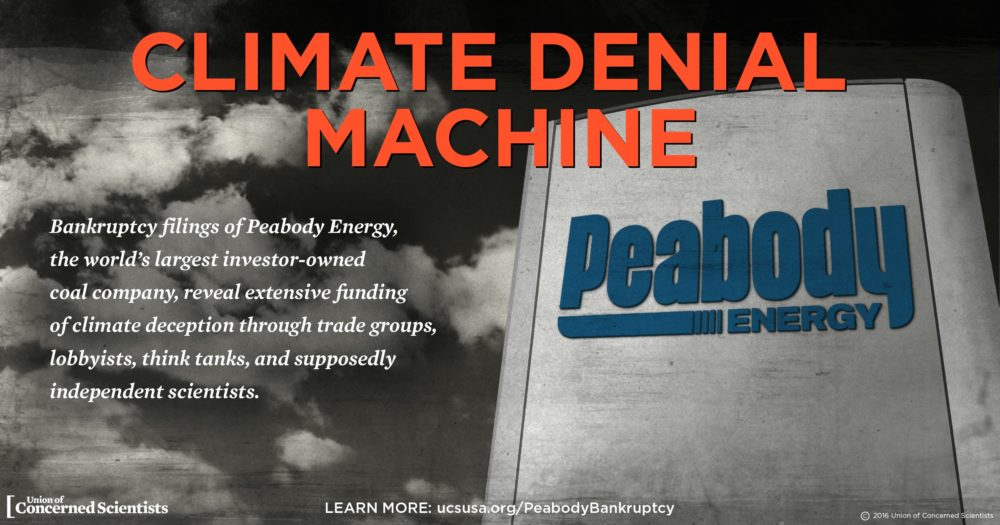There are lots of places where we can get information about companies’ political activities, right? I’ve talked about companies’ contributions to candidates and lobbying spending, affiliations with trade groups, and funding of scientists and other third-party organizations. But we know these information sources don’t show the whole picture.
On rare occasions, new information reveals that publicly available information is merely a small fraction of what companies are doing behind closed doors. Newly released bankruptcy filings from Peabody Energy confirm these suggestions to the highest degree. Indeed, the documents show that Peabody funded an extensive network of climate contrarian organizations for years without any public scrutiny.
Peabody files for bankruptcy, releases documents about its payments

Newly released bankruptcy filings from Peabody Energy illuminate the lack of transparency around corporate political activities.
The Union of Concerned Scientists predicted that bankruptcy would force Peabody Energy to reveal previously undisclosed evidence of its ties to what academic researchers have dubbed the climate change counter-movement, and indeed it has. Here are some important details we’ve learned about Peabody’s role in undermining climate science and science-based policy efforts.
First, others at the Center for Media & Democracy and The Guardian recently found some documentation that suggests Peabody Energy’s network of climate contrarians may rival (and overlap with) those funded by ExxonMobil and the Koch brothers.
These initial revelations generated sufficient attention to prompt this cagey response from Peabody Energy Vice President Vic Svec: “While we wouldn’t comment on alliances with particular organizations, Peabody has a track record of advancing responsible energy and environmental policies, and we support organizations that advocate sustainable mining, energy access and clean coal solutions, in line with our company’s leadership in these areas.”
New data on Peabody’s role in climate denial
Patrick Fitzgerald at the Wall Street Journal covered the bankruptcy filing connecting Peabody to the Energy & Environment Legal Institute (E&E Legal), and passed a link to the publicly available document to my colleague Dave Anderson. We found new details on Peabody’s funding of a number of special interest groups involved in efforts to deceive the public and policy makers about the reality and risks of climate change, and to obstruct action to limit greenhouse gas emissions from fossil fuels.
We now know that from 2014 to 2015, at least $332,000 in “charitable gifts and contributions” was routed through a company subsidiary, Peabody Investment Corporation, to special interest groups involved in attacks on climate science and clean energy policies. We also now know that Peabody Investment Corp. doled out millions of dollars to law firms involved in attacks on the Environmental Protection Agency’s Clean Power Plan (during the 90-day period before the company declared bankruptcy) in April 2016.
The amount and timing of these gifts raise further questions about Peabody Energy’s role in the climate change counter movement—questions we should expect any company that wants to be viewed as a responsible actor on climate change to answer.
$133,500 to the American Legislative Exchange Council
Peabody Energy previously disclosed its 2014 and 2015 membership in the American Legislative Exchange Council (ALEC), but did not disclose many specifics about its payments to ALEC. (As a nonprofit, ALEC does not have to disclose its donors, and companies don’t have to disclose indirect political contributions like those to ALEC.) We now know that Peabody Investment Corp. contributed at least $133,500 to ALEC over the two-year period, paid out over 11 installments.

A sample of payments from Peabody to ALEC between 2014 and 2015 as shown in the company’s bankruptcy filings.
Nearly half (5) of Peabody’s newly disclosed payments to ALEC occurred in July of 2014, the same month that Peabody Energy sponsored ALEC’s annual meeting in Dallas. At the meeting, ALEC hosted misleading presentations by representatives of the Committee for a Constructive Tomorrow (CFACT) and the Heartland Institute, who sought to deceive the state legislators in attendance about the reality and risks of climate change. The legislators were then urged to introduce ALEC’s “model policies” aimed at rolling back clean energy policies back home.
Michael Blank, director of state government relations for Peabody Energy, is currently listed as a member of ALEC’s Private Enterprise Advisory Council, where he serves along with representatives from ExxonMobil and Koch Public Sector, LLC. ALEC remains at the forefront of attacks on the EPA’s efforts to limit greenhouse gas emissions from coal-fired power plants via the Clean Power Plan.
$25,000 to the National Black Chamber of Commerce
Another $25,000 in previously unknown Peabody Investment Corp. payments went to the National Black Chamber of Commerce (NBCC). Harry Alford, president and CEO of the NBCC, has falsely claimed that, “… there is no sound science to support the claims of Global Warming.” Alford has previously acknowledged that his group has received funding from other fossil fuel interests, including $1 million from ExxonMobil and sponsorships from Chevron and Koch Industries.
In June of 2015, Peabody contributed $10,000 to the NBCC. That same month, the NBCC released a report that ostensibly examined the “Potential Impact of Proposed EPA Regulations on Low Income Groups and Minorities”—an attack on the Environmental Protection Agency’s Clean Power Plan that raised a lot of eyebrows in communities of color last summer. The NBCC commissioned Roger Bezdek, a consultant with Management Information Services, Inc. (whose client list includes Peabody Energy), to write the report. Peabody Energy then promoted the NBCC report on its public relations website, AdvancedEnergyForLife.com, and Alford later provided congressional testimony on the report before a subcommittee of the Senate Judiciary Committee, chaired by Senator Ted Cruz.
The NBCC’s attacks on the EPA’s Clean Power Plan have since been thoroughly debunked by UCS and other experts, and refuted by leading members of the African-American community.
$50,000 to the Committee for a Constructive Tomorrow
Peabody Investment Corp. made $50,000 in previously undisclosed payments to CFACT over the same two-year period. CFACT is responsible for the climate contrarian website, ClimateDepot.org. Marc Morano, CFACT’s director of communications, has suggested that climate scientists “deserve to be publicly flogged.”
One $5,000 Peabody gift to CFACT was made in August of 2014, shortly after the group’s misrepresentation of climate science at ALEC’s annual meeting in Dallas. Another occurred in November of 2015, when CFACT announced that the world premiere of its new climate denial film, Climate Hustle, would take place in Paris, timed to coincide with the historic international climate change negotiations that took place there.
Just the tip of the iceberg
Peabody Investment Corp. also disclosed gifts to several of the other organizations mentioned in the earlier reporting, including the Energy & Environment Legal Institute ($8,500)—a firm known for its harassment of climate scientists through open records requests, Franklin Center for Public Integrity ($10,000), Independence Institute ($15,000), Institute for Energy Research ($50,000), Texas Public Policy Foundation ($40,000).
Others have pointed to bankruptcy filings suggesting that Peabody Energy plans to continue making payments to lawyers involved in litigation aimed at derailing the EPA’s Clean Power Plan.
Peabody filed for bankruptcy in April 2016. The document we reviewed lists $2,943,360 in previously undisclosed 2016 payments that Peabody Investment Corp. made to one such law firm—Shook, Hardy & Bacon LLP—in the 90 days before Peabody Energy and its many subsidiaries filed for bankruptcy.
It is worth noting here that as Peabody lays off workers and ignores calls for the company to take responsibility for its water and land pollution, more payments to the same lawyers fighting the Clean Power Plan are planned. In addition, the name of the same law firm appeared on Peabody Energy’s 2014 Clean Power Plan comments (which included an unhealthy dose of climate denial).
I’m certain we will see more evidence accumulate and more questions emerge as Peabody Energy’s bankruptcy filings continue to pile up.
A lack of transparency in corporate political activities
Aside from the sheer amount of money Peabody devoted to climate denial, what shocks me most about the bankruptcy filings is how much we didn’t know without them. A startling lack of transparency surrounds corporate political activities, and these documents prove it.
In 2012, I conducted an analysis on climate-related political activities of 28 companies, including Peabody Energy. I looked at Peabody’s direct lobbying and political contributions, its public comments to government agencies and its public statements, but I couldn’t link it to ALEC, CFACT, NBCC, or any of the other entities discussed above. There was no public evidence of it.
What I did learn from that analysis is that companies’ public statements on climate change don’t always align with their activities behind the scenes. Most of the scrutinized companies—including Peabody—made some climate-action-supporting statements but many also funded contrarian trade groups, think tanks, and other third-party organizations.
Without further transparency in corporate political activities, we are left to wonder what other companies might be involved in the funding of climate contrarian organizations. Legal proceedings like bankruptcy filings are one of the few tools to bring such political activities to light. We need better disclosure policies (which could be achieved through the president, Congress, or the U.S. Securities and Exchange Commission), but until then, we can trust that more companies are engaged on climate science and policy development, if without the public’s knowledge.
Correction (June 30, 2016): An earlier version of this post incorrectly listed the amount of money given to the Texas Public Policy Foundation. It is $40,000, not $45,000.

